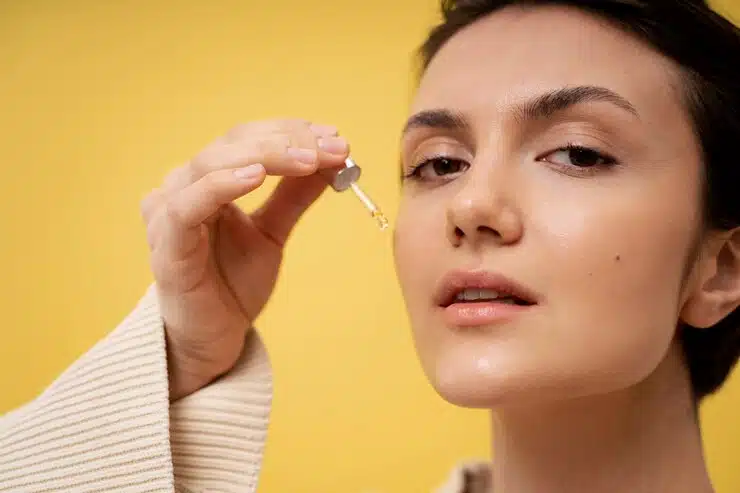Skincare is an art that transcends skin types, and individuals with oily skin often find themselves grappling with unique challenges. While a radiant complexion is the ultimate goal, those with oily skin may struggle to strike the right balance between managing excess sebum production and achieving a healthy glow. In this comprehensive guide, we will delve into the intricacies of oily skin and explore effective solutions to transform your skincare routine from a greasy ordeal to a glamorous affair.
Understanding Oily Skin
Oily skin is characterized by an overproduction of sebum, the natural oil produced by the skin. This excess oil can lead to a shiny complexion, enlarged pores, and an increased likelihood of acne and blemishes. Genetics, hormonal fluctuations, and environmental factors all play a role in determining an individual’s skin type.

The Importance Of Skincare For Oily Skin
Contrary to popular belief, oily skin requires meticulous care and attention. Neglecting proper skincare can exacerbate issues like acne, blackheads, and an uneven skin tone. A well-designed skincare routine can help regulate sebum production, unclog pores, and promote a balanced and healthy complexion.
Cleansing For Success
The foundation of any effective skincare routine is a thorough cleansing process. For individuals with oily skin, it’s crucial to choose a gentle yet effective cleanser that removes excess oil without stripping the skin of its natural moisture. We will explore various cleansing techniques, including double cleansing and the use of oil-based cleansers, to achieve a clean and refreshed canvas.

Exfoliation: The Key To Radiance
Exfoliation is a game-changer for oily skin. By removing dead skin cells, excess oil, and impurities, exfoliation helps unclog pores and promotes cell turnover. However, not all exfoliants are created equal. We will delve into the world of chemical and physical exfoliants, exploring the best options for oily skin and how to incorporate them seamlessly into your routine.
Hydration Without Hesitation
One common misconception is that individuals with oily skin should skip moisturizing. On the contrary, maintaining proper hydration is essential to balance oil production and prevent the skin from overcompensating by producing even more sebum. We will explore lightweight and non-comedogenic moisturizers that nourish the skin without clogging pores, ensuring a hydrated and radiant complexion.
Serums And Treatments For Oily Skin Woes
Serums and targeted treatments can be powerful allies in the battle against oily skin issues. From salicylic acid to niacinamide, we will dissect the science behind these ingredients and guide you in selecting the right products to address specific concerns such as acne, inflammation, and hyperpigmentation.

Sun Protection: A Non-Negotiable Step
Regardless of your skin type, sun protection is non-negotiable. Oily skin individuals may shy away from sunscreens, fearing a greasy and heavy feel. However, we will explore lightweight, oil-free options that provide adequate sun protection without compromising on comfort, ensuring your skin stays shielded from harmful UV rays.
Makeup Tips For Oily Skin
For those who love makeup, oily skin can present challenges in achieving a flawless, long-lasting look. We will delve into the world of mattifying primers, oil-free foundations, and setting powders to help you achieve a makeup routine that stays put throughout the day, minus the unwanted shine.

Lifestyle Changes For Oily Skin Success
Beyond skincare products, certain lifestyle changes can contribute to managing oily skin. From dietary considerations to stress management, we will discuss holistic approaches to ensure your skincare routine is supported by a healthy lifestyle that promotes overall well-being.
Also Read:- Arctic Beauty Secrets: Unveiling The Perfect Winter Skincare Routine
Advanced Solutions: Professional Treatments And Dermatological Approaches
For those seeking more advanced solutions, we will explore professional treatments and dermatological approaches that can provide targeted and effective results. From chemical peels to laser therapies, understanding these options can empower individuals with oily skin to make informed decisions about their skincare journey.
Conclusion:
Transforming your skincare routine from a greasy struggle to a glamorous experience is entirely achievable with the right knowledge and products. By understanding the unique needs of oily skin and adopting a tailored approach, you can embark on a journey towards a radiant and balanced complexion. With the insights provided in this comprehensive guide, you’ll be equipped to elevate your skincare routine, embrace your natural beauty, and confidently face the world with a glamorous glow.
FAQs
Q1: Why is it important to have a specialized skincare routine for oily skin?
Oily skin has unique needs that differ from other skin types. A tailored skincare routine helps control excess oil production, prevent breakouts, and promote a healthier complexion.
Q2: How do I determine if I have oily skin?
Oily skin is characterized by enlarged pores, a shiny complexion, and a tendency to develop acne. If you notice excessive oiliness, especially in the T-zone (forehead, nose, and chin), you likely have oily skin.
Q3: Can oily skin benefit from moisturizing?
Yes, absolutely! Oily skin still needs hydration. Opt for oil-free and non-comedogenic moisturizers to maintain the skin’s moisture balance without clogging pores.
Q4: What ingredients should I look for in skincare products for oily skin?
Choose products containing salicylic acid, niacinamide, hyaluronic acid, and oil-free formulas. These ingredients help control oil, unclog pores, and provide adequate hydration.
Q5: How often should I exfoliate oily skin?
Exfoliation is crucial for oily skin, but moderation is key. Aim for 1-3 times per week to remove dead skin cells, unclog pores, and promote cell turnover without over-stripping the skin.
Q6: Can oily skin benefit from using face masks?
Absolutely! Clay masks with ingredients like kaolin or bentonite help absorb excess oil, while masks with antioxidants can soothe and nourish oily skin.
Q7: Should I avoid using sunscreen on oily skin?
No, sunscreen is a must for all skin types, including oily skin. Choose oil-free, non-comedogenic sunscreens to protect your skin from harmful UV rays without exacerbating oiliness.
Q8: Can diet affect oily skin?
Yes, a balanced diet plays a role in skin health. Consuming omega-3 fatty acids, fruits, and vegetables can help regulate oil production and promote a clearer complexion.
Q9: How do I control shine throughout the day?
Keep blotting papers or oil-absorbing sheets on hand to gently blot away excess oil. Avoid overusing powder, as it can lead to a cakey appearance.
Q10: Is it necessary to consult a dermatologist for oily skin concerns?
While a consistent skincare routine can help manage oily skin, consulting a dermatologist is advisable for personalized advice, especially if you’re dealing with persistent acne or skin issues.
Elevate your skincare routine by understanding and embracing the unique needs of oily skin. With the right products and practices, you can achieve a radiant and balanced complexion.





